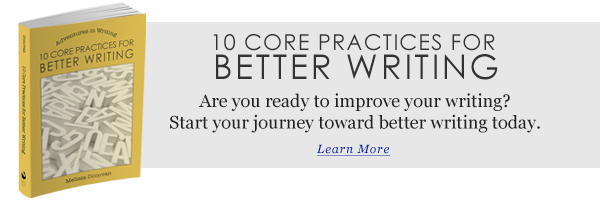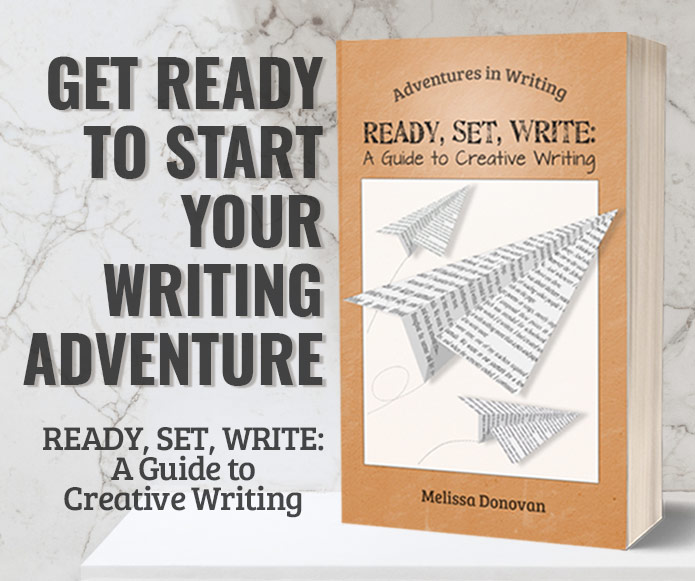Today’s post is an excerpt from 10 Core Practices for Better Writing. This is from “Chapter Two: Writing,” and it’s for people who are wondering how to become a writer.
First, Give Yourself Permission to Write
“A professional writer is an amateur who didn’t quit.” – Richard Bach
I admire people who are fearless. When they want to do something, they do it. They don’t worry, plan, wonder, analyze, or seek permission. They simply do what they want to do.
But most of us are more cautious. We’ve experienced failure. We don’t like taking risks. We’ve seen amateurs trying to pass themselves off as professionals. We’ve had our writing critiqued and the feedback wasn’t good. We set the bar high — nothing short of a potential bestseller is worth writing.
When the mind is clouded with these thoughts, it’s hard to try new things. We don’t want to make fools of ourselves. And who are we to take up writing anyway?
Some people are intimidated by the blank page. Others are intimidated by grammar. Many think they are simply not qualified. There are plenty of reasons to refuse to write even if writing is what you want to do:
- I didn’t go to college.
- I went to college, but I didn’t take a writing class.
- I have a story to tell, but I’m not a writer.
- I was never good at English.
- I could never be as good as my favorite author.
- It’s too hard to get published.
- I don’t know anything about publishing or marketing.
- Writing is too hard.
- There’s no money in it.
How to Become a Writer
The first thing you need to do is stop making excuses, and then you need to give yourself permission to write.
Almost every excuse for not writing is fear based. You’re afraid you’re not qualified. You’re afraid it will be too difficult for you. You’re afraid of failure.
We all experience fear. It’s not unusual for people to want to write, but to feel as though they shouldn’t. I’m here to tell you that the fear may never completely go away. Most of the time, I crack open a new notebook or document and dive right in. But when I’m working on a big, meaningful, or important project, I get a little nervous. I procrastinate. I question whether I’m cut out for it.
But that doesn’t stop me. I force myself to write that first sentence, even if it sucks. Then I write the next sentence and the next one. Who cares if it’s no good? Nobody can see it but me, and I get to go back and clean it up before I show it to anyone else. I’ve got nothing to lose, so why would I let all those irrational fears stop me?
One day, one of my relatives approached me, sat me down, and said in all seriousness, “I’m thinking about writing,” and then looked at me expectantly, while I sat there thinking, Okay. So go write.
Suddenly, I realized that this person was asking me for permission to write. I somehow became part of the equation of whether or not someone would pursue writing. Which is ridiculous.
Look, nobody needs to give you permission to write. If you want to write, then write. Stop making excuses; stop looking for a magic talisman that will turn you into Shakespeare. Just write.
Am I a Writer?
Lots of people fret over this question. There are discussions all over the internet about who qualifies as a writer. Do you need a degree? Do you have to have published something? Earned income from writing? At what point do you go from being a normal person to being a writer?
For me, the answer is simple: if you write, then you’re a writer. Now, that doesn’t mean you should jot writer down as your profession on a form or application. It’s only your occupation if you make a living at it (or any income whatsoever). But in a general sense, people who write are writers. If you want to split hairs and talk about writers who write professionally or who make a living writing, then we call those people authors.
The real question is not whether you’re a writer. It’s what kind of writer are you? Are you a writer who writes when the mood strikes? Do you wait for inspiration and then write only a few times a year? Is writing a hobby or do you want to make writing your career? Is your goal to get published? Do you want to improve your writing?
Are you wondering how to become a writer? Start by giving yourself permission to write, and then make a commitment to writing.






If you are only an author if you make a living at writing, then there aren’t those many authors. Most of us only make a tiny amount, if anything.
I don’t call myself an author, though, even though I’ve got thirteen books published with a small publisher. I’m certainly not making much money, nor anywhere near making it a career.
I don’t write every day, because sometimes life gets in the way, but I do write most days. For the last year I’ve been trying to write a poem a day. I’ve more or less managed it and am about to publish a book of these poems for the reader to read one a day.
“Look, nobody needs to give you permission to write. If you want to write, then write. ”
Excellent advice, Melissa, thank you!
Thanks, Ronald! Keep writing.
I loved this article! Yes!! Writers are always so invalidated on their craft. I personally believe that everyone has at least one book within them. And you are right. Writers write. Period! No permission needed.
Thanks, Laura. I’ve always been perplexed by people who think they are the authority on who is or is not a *real* writer. What else would you call someone who writes?